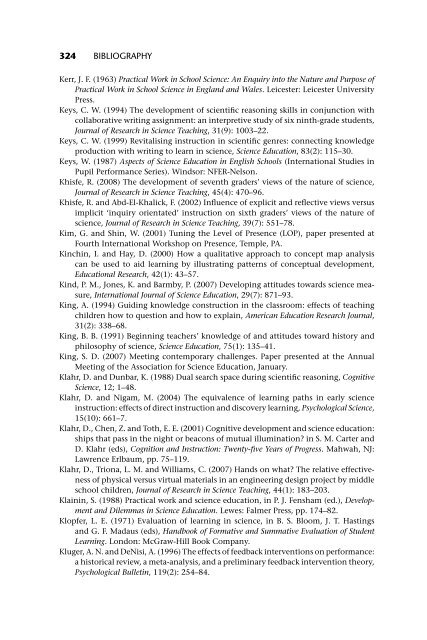good-practice-in-science-teaching-what-research-has-to-say
good-practice-in-science-teaching-what-research-has-to-say
good-practice-in-science-teaching-what-research-has-to-say
Create successful ePaper yourself
Turn your PDF publications into a flip-book with our unique Google optimized e-Paper software.
324 BIBLIOGRAPHY<br />
Kerr, J. F. (1963) Practical Work <strong>in</strong> School Science: An Enquiry <strong>in</strong><strong>to</strong> the Nature and Purpose of<br />
Practical Work <strong>in</strong> School Science <strong>in</strong> England and Wales. Leicester: Leicester University<br />
Press.<br />
Keys, C. W. (1994) The development of scientific reason<strong>in</strong>g skills <strong>in</strong> conjunction with<br />
collaborative writ<strong>in</strong>g assignment: an <strong>in</strong>terpretive study of six n<strong>in</strong>th-grade students,<br />
Journal of Research <strong>in</strong> Science Teach<strong>in</strong>g, 31(9): 1003–22.<br />
Keys, C. W. (1999) Revitalis<strong>in</strong>g <strong>in</strong>struction <strong>in</strong> scientific genres: connect<strong>in</strong>g knowledge<br />
production with writ<strong>in</strong>g <strong>to</strong> learn <strong>in</strong> <strong>science</strong>, Science Education, 83(2): 115–30.<br />
Keys, W. (1987) Aspects of Science Education <strong>in</strong> English Schools (International Studies <strong>in</strong><br />
Pupil Performance Series). W<strong>in</strong>dsor: NFER-Nelson.<br />
Khisfe, R. (2008) The development of seventh graders’ views of the nature of <strong>science</strong>,<br />
Journal of Research <strong>in</strong> Science Teach<strong>in</strong>g, 45(4): 470–96.<br />
Khisfe, R. and Abd-El-Khalick, F. (2002) Influence of explicit and reflective views versus<br />
implicit ‘<strong>in</strong>quiry orientated’ <strong>in</strong>struction on sixth graders’ views of the nature of<br />
<strong>science</strong>, Journal of Research <strong>in</strong> Science Teach<strong>in</strong>g, 39(7): 551–78.<br />
Kim, G. and Sh<strong>in</strong>, W. (2001) Tun<strong>in</strong>g the Level of Presence (LOP), paper presented at<br />
Fourth International Workshop on Presence, Temple, PA.<br />
K<strong>in</strong>ch<strong>in</strong>, I. and Hay, D. (2000) How a qualitative approach <strong>to</strong> concept map analysis<br />
can be used <strong>to</strong> aid learn<strong>in</strong>g by illustrat<strong>in</strong>g patterns of conceptual development,<br />
Educational Research, 42(1): 43–57.<br />
K<strong>in</strong>d, P. M., Jones, K. and Barmby, P. (2007) Develop<strong>in</strong>g attitudes <strong>to</strong>wards <strong>science</strong> measure,<br />
International Journal of Science Education, 29(7): 871–93.<br />
K<strong>in</strong>g, A. (1994) Guid<strong>in</strong>g knowledge construction <strong>in</strong> the classroom: effects of teach<strong>in</strong>g<br />
children how <strong>to</strong> question and how <strong>to</strong> expla<strong>in</strong>, American Education Research Journal,<br />
31(2): 338–68.<br />
K<strong>in</strong>g, B. B. (1991) Beg<strong>in</strong>n<strong>in</strong>g teachers’ knowledge of and attitudes <strong>to</strong>ward his<strong>to</strong>ry and<br />
philosophy of <strong>science</strong>, Science Education, 75(1): 135–41.<br />
K<strong>in</strong>g, S. D. (2007) Meet<strong>in</strong>g contemporary challenges. Paper presented at the Annual<br />
Meet<strong>in</strong>g of the Association for Science Education, January.<br />
Klahr, D. and Dunbar, K. (1988) Dual search space dur<strong>in</strong>g scientific reason<strong>in</strong>g, Cognitive<br />
Science, 12; 1–48.<br />
Klahr, D. and Nigam, M. (2004) The equivalence of learn<strong>in</strong>g paths <strong>in</strong> early <strong>science</strong><br />
<strong>in</strong>struction: effects of direct <strong>in</strong>struction and discovery learn<strong>in</strong>g, Psychological Science,<br />
15(10): 661–7.<br />
Klahr, D., Chen, Z. and Toth, E. E. (2001) Cognitive development and <strong>science</strong> education:<br />
ships that pass <strong>in</strong> the night or beacons of mutual illum<strong>in</strong>ation <strong>in</strong> S. M. Carter and<br />
D. Klahr (eds), Cognition and Instruction: Twenty-five Years of Progress. Mahwah, NJ:<br />
Lawrence Erlbaum, pp. 75–119.<br />
Klahr, D., Triona, L. M. and Williams, C. (2007) Hands on <strong>what</strong> The relative effectiveness<br />
of physical versus virtual materials <strong>in</strong> an eng<strong>in</strong>eer<strong>in</strong>g design project by middle<br />
school children, Journal of Research <strong>in</strong> Science Teach<strong>in</strong>g, 44(1): 183–203.<br />
Kla<strong>in</strong><strong>in</strong>, S. (1988) Practical work and <strong>science</strong> education, <strong>in</strong> P. J. Fensham (ed.), Development<br />
and Dilemmas <strong>in</strong> Science Education. Lewes: Falmer Press, pp. 174–82.<br />
Klopfer, L. E. (1971) Evaluation of learn<strong>in</strong>g <strong>in</strong> <strong>science</strong>, <strong>in</strong> B. S. Bloom, J. T. Hast<strong>in</strong>gs<br />
and G. F. Madaus (eds), Handbook of Formative and Summative Evaluation of Student<br />
Learn<strong>in</strong>g. London: McGraw-Hill Book Company.<br />
Kluger, A. N. and DeNisi, A. (1996) The effects of feedback <strong>in</strong>terventions on performance:<br />
a his<strong>to</strong>rical review, a meta-analysis, and a prelim<strong>in</strong>ary feedback <strong>in</strong>tervention theory,<br />
Psychological Bullet<strong>in</strong>, 119(2): 254–84.


